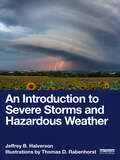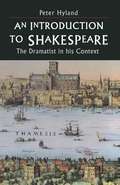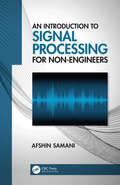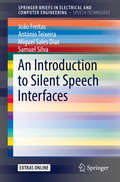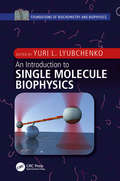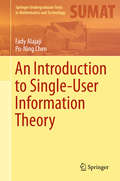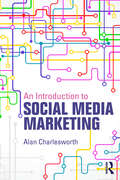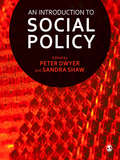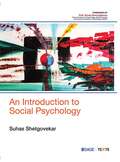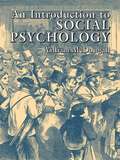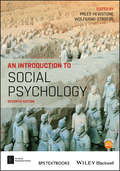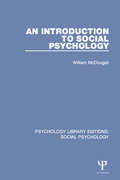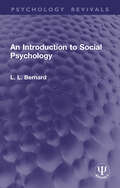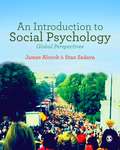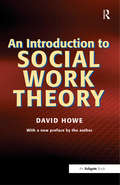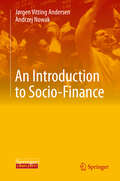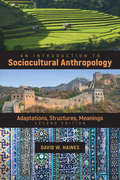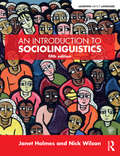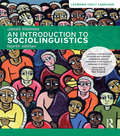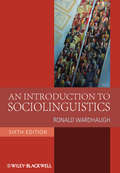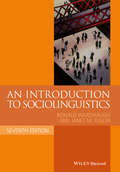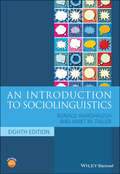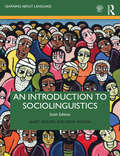- Table View
- List View
An Introduction to Severe Storms and Hazardous Weather
by Jeffrey B. HalversonThis book presents a deep and encompassing survey of severe weather in all its forms. An Introduction to Severe Storms and Hazardous Weather is an exciting new textbook that allows students to learn the principles of atmospheric science through the drama, exhilaration, and even tragedy of severe weather.Balancing breadth and depth, Jeffrey B. Halverson adeptly combines a short, accessible introduction to the basic principles of meteorology with detailed coverage on large- and small-scale weather hazards. He draws on specific up-to-date case studies from North America to illustrate the cause of meteorological events including hurricanes, heavy snow and ice, floods, and tornadoes. Unlike existing books on the market, Halverson delves deep into the societal impacts of these events, drawing on examples from agriculture, utility infrastructure, and commercial aviation. Each chapter also features high-quality, customized color artwork by Thomas D. Rabenhorst that helps to enhance and embed learning.Thorough in its scope, and written with an impeccable focus on the science, this book will be an essential resource for introductory undergraduate courses in severe weather, natural hazards, and extreme meteorology. It is also an excellent supplemental textbook for courses on meteorology and atmospheric science.
An Introduction to Shakespeare
by Marchette ChuteFor children, a biography of William Shakespeare with very short synopses of his plays.
An Introduction to Shakespeare
by Peter HylandPeter Hyland provides a highly readable account of the historical, social and political pressures of Shakespeare's England and the material conditions under which his plays were written, including a comprehensive description of the development and status of the theatrical profession. Half of the book is given over to a survey of the plays and examines numerous controversial issues that arise when we ask precisely what we can 'know' about them. For those who are daunted by the volume or the impenetrable prose of much recent writing on Shakespeare, Hyland's book will be a stimulating introduction.
An Introduction to Signal Processing for Non-Engineers
by Afshin SamaniThis book introduces the basic concepts of signal processing for scientists and students with no engineering background. The book presents the concepts with minimum use of mathematical formulations and more emphasis on visual illustrations. The idea is to present an intuitive approach to understanding the basics of signal processing and exemplify some practical applications of the concepts by which the readers achieve basic knowledge and skills in signal processing. Most of illustrations in the book have been created by computer programming in MATLAB®; thus, the reader will learn the basics of using computers in signal processing applications.
An Introduction to Silent Speech Interfaces (SpringerBriefs in Speech Technology)
by João Freitas António Teixeira Miguel Sales Dias Samuel SilvaThis book provides a broad and comprehensive overview of the existing technical approaches in the area of silent speech interfaces (SSI), both in theory and in application. Each technique is described in the context of the human speech production process, allowing the reader to clearly understand the principles behind SSI in general and across different methods. Additionally, the book explores the combined use of different data sources, collected from various sensors, in order to tackle the limitations of simpler SSI approaches, addressing current challenges of this field. The book also provides information about existing SSI applications, resources and a simple tutorial on how to build an SSI.
An Introduction to Single Molecule Biophysics (Foundations of Biochemistry and Biophysics)
by Yuri L. LyubchenkoThis book gives an accessible, detailed overview on techniques of single molecule biophysics (SMB), showing how they are applied to numerous biological problems associated with understanding the molecular mechanisms of DNA replication, transcription, and translation, as well as functioning of molecular machines. It covers major single molecule imaging and probing techniques, highlighting key strengths and limitations of each method using recent examples. The chapters begin with a discussion of single molecule fluorescence techniques followed by an overview of the atomic force microscope and its use for direct time-lapse visualization of dynamics of molecular complexes at the nanoscale, as well as applications in measurements of interactions between molecules and mechanical properties of isolated molecules and their complexes. The next chapters address magnetic tweezers and optical tweezers, including instrumentation, fundamentals of operation, and applications. A final chapter turns to nanopore transport and nanopore-based DNA sequencing technology that will play a major role in next-generation genomics and healthcare applications.
An Introduction to Single-User Information Theory (Springer Undergraduate Texts in Mathematics and Technology)
by Fady Alajaji Po-Ning ChenThis book presents a succinct and mathematically rigorous treatment of the main pillars of Shannon’s information theory, discussing the fundamental concepts and indispensable results of Shannon’s mathematical theory of communications. It includes five meticulously written core chapters (with accompanying problems), emphasizing the key topics of information measures; lossless and lossy data compression; channel coding; and joint source-channel coding for single-user (point-to-point) communications systems. It also features two appendices covering necessary background material in real analysis and in probability theory and stochastic processes.The book is ideal for a one-semester foundational course on information theory for senior undergraduate and entry-level graduate students in mathematics, statistics, engineering, and computing and information sciences. A comprehensive instructor’s solutions manual is available.
An Introduction to Social Media Marketing
by Alan CharlesworthSocial media has given marketers a way to connect with consumers in an unprecedented and revolutionary way, but the very newness of this medium is as challenging as it is exciting, particularly to those who aren't 'digital natives'. This is the first textbook for students that offers a step by step guide to this newly dominant marketing discipline. Mirroring its sister text Digital Marketing: a Practical Approach, this book is grounded in solid academic underpinnings, but has a lighter, hands-on approach that is perfect for shorter courses and additional reading. Chapter exercises not only help develop knowledge, but test the learners' understanding of how the various concepts and models are best used by requiring them to investigate how they are best applied in real-world scenarios. The book is supported by the author's excellent website, which includes links to continually updated statistics as well as articles that keep the reader in touch with the constant changes to this dynamic area. Topics covered in this book include: Social networking Consumer reviews Social service and support Real-time social media marketing Blogging Viral marketing and influencers Advertising on social media And much more. An Introduction to Social Media Marketing is the first of its kind and ideal reading for students who want to work in a digital marketing environment, as well as the traditional marketer who wants to get to grips with this vibrant, and potentially lucrative facet of present-day marketing.
An Introduction to Social Policy
by Sandra Shaw Peter DwyerAn Introduction to Social Policy explores essential welfare topics, themes and issues for students studying social policy or related disciplines such as sociology, social work, or nursing and social care. - Part One examines key concepts including welfare, social justice, diversity and health and well-being. - Part Two explores policy issues in relation to key stages of the lifecourse. - Part Three takes a comparative perspective, discussing the international issues and supranational bodies that impact on British and European social policy today. The concise chapters define the key terms and outline the central debates, giving students a fundamental foundation for their degree. Chapter overviews and summaries guide readers through the book, and questions for reflection conclude each chapter to test readers' knowledge. This book is essential reading for all students of social policy and the social sciences, as well as those taking joint honours programmes in social work, sociology, criminology, politics and social care. Peter Dwyer is Professor of Social Policy at the University of Salford. Sandra Shaw is Senior Lecturer in Social Policy at the University of Salford.
An Introduction to Social Psychology
by Suhas ShetgovekarThis textbook will help students of psychology and related disciplines to understand the fundamentals of social psychology and its application in the Indian context An Introduction to Social Psychology offers a thorough understanding of all basic concepts and methods of social psychology in a lucid and interactive manner. It enables readers to grasp the idea of the self or the individual in the social context and understand the recent developments in the area of applied social psychology. The book is written for undergraduate and postgraduate students of social psychology, sociology, social works and other related disciplines. Every chapter begins with a well-defined set of learning objectives and includes review exercises and project-based activities. Readers would be introduced to the fundamentals and the emerging perspectives in the subject through numerous illustrations, exercises, activities, research data, case studies and links to further reading. Key Features The language used emphasises clarity and avoids technical jargons to aid ease of understanding Covers current perspective, trends and research in social psychology, with a special focus on the Indian context Text supported by tables, figures and boxed-examples to aid in understanding and retention of concepts learned Inclusion of chapter-wise review questions and multiple choice questions to test learner's progress and comprehension of the subject
An Introduction to Social Psychology
by William McDougallA pioneering work in psychology, this enormously influential book served as a catalyst in the study of the foundations of social behavior. Ironically, its approach marked such a dramatic departure from contemporary trends that it stimulated little follow-up research at the time of its 1908 publication. In recent years, however, the author's ideas have been resurrected in sociobiological reasoning, making the republication of this systematic treatise particularly timely. McDougall's work grounds social behavior in biology, focusing on the individual and attributing most social behavior to instinct. This reasoning makes his work one of the first in modern psychology to take human motivation as its central concern. As one of the initial texts of social psychology, it assisted in laying the foundations of a new discipline, separating the field from its forerunners, sociology and general psychology. McDougall's emphasis on the instinctive basis of social phenomena also helped promote the individualistic approach typical of modern social psychology. Popular, long-lived, and ever-relevant, this landmark work is guaranteed a wide audience among teachers and students of psychology.
An Introduction to Social Psychology (BPS Textbooks in Psychology)
by Wolfgang Stroebe Miles HewstoneThis definitive resource in social psychology includes engaging study tools designed to help students grasp the underlying theories and the latest research in the field. In the 7th edition of An Introduction to Social Psychology, students will discover a wealth of tools to help them understand the theories and fundamental knowledge in the ever-evolving field of social psychology. With contributions leading psychologists, this feature-rich edition includes Theory Boxes, Research Close-ups, and Lab Boxes to help cement students’ understanding of the study material. This essential study guide has been engaging and educating students on social psychology theories and research for over 34 years. For students entering into the world of social psychology for the first time, this book covers foundational topics, such as: ● The history of social psychology throughout Europe ● Updated research methods and newly developed theories ● In-depth looks at social cognition, aggression, prosocial behavior, and relationships ● Strategies for changing attitude and behavior ● Critical study materials for multiple-choice testing The combination of traditional academic study with cohesion of topics, accessibility of material, and pedagogy in this 7th edition makes it a definitive resource for both instructors and beginning psychology students alike.
An Introduction to Social Psychology (Psychology Library Editions: Social Psychology)
by William McDougallOn its first publication in 1908 this pioneer book received immediate acclaim and was thought to have probably done more than any other single publication to stimulate study of the foundations of social behaviour. Professor McDougall was the most powerful advocate of an idealistic outlook on human life and activity, and his ideas continued to attract attention even when published in paperback form in 1960.
An Introduction to Social Psychology (Psychology Revivals)
by L. L. BernardOriginally published in 1927, An Introduction to Social Psychology represents an attempt at a more synthetic type of treatment of the field than had previously been given. The author felt that the time had arrived when “schools” of social psychology may properly be regarded as obsolete and the subject as a whole may be presented systematically. At the time social psychology was emerging as a separate discipline and overlapped a very large portion of social science, psychology and education. In this respect it was central to all psychological and social science disciplines. This volume treats the subject from the standpoint of the more objective factors which integrate the personality and its responses in a social environment. Today it can be read in its historical context.This book is a re-issue originally published in 1927. The language used and views portrayed are a reflection of its era and no offence is meant by the Publishers to any reader by this re-publication.
An Introduction to Social Psychology: Global Perspectives
by James Alcock Stan SadavaPsychology recognises no borders. The relationships between people and the groups they form are determined by similar principles no matter where in the world they come from. This book has been written to introduce students from all countries and backgrounds to the exciting field of social psychology. Recognising the limitations that come from studying the subject through the lens of any one culture, James Alcock and Stan Sadava have crafted a truly international social psychology book for the modern era. Based on classic and cutting-edge scholarship from across the world, An Introduction to Social Psychology encourages mastery of the basics as well as critical thinking. Incorporating relevant insights from social neuroscience, evolutionary theory and positive psychology, it offers: Chapters on crowd behaviour and applied social psychology Discussion of new means of social interaction, including social media Relevant insights from social neuroscience, evolutionary theory and positive psychology A companion website at study.sagepub.com/alcocksadava featuring extensive additional resources for students and instructors
An Introduction to Social Psychology: Global Perspectives
by James Alcock Stan SadavaPsychology recognises no borders. The relationships between people and the groups they form are determined by similar principles no matter where in the world they come from. This book has been written to introduce students from all countries and backgrounds to the exciting field of social psychology. Recognising the limitations that come from studying the subject through the lens of any one culture, James Alcock and Stan Sadava have crafted a truly international social psychology book for the modern era. Based on classic and cutting-edge scholarship from across the world, An Introduction to Social Psychology encourages mastery of the basics as well as critical thinking. Incorporating relevant insights from social neuroscience, evolutionary theory and positive psychology, it offers: Chapters on crowd behaviour and applied social psychology Discussion of new means of social interaction, including social media Relevant insights from social neuroscience, evolutionary theory and positive psychology A companion website at study.sagepub.com/alcocksadava featuring extensive additional resources for students and instructors
An Introduction to Social Work Theory
by David HoweSocial workers need to recognize the critical role that theory plays both in the way they make sense of what is going on and in the way they order their work. Such recognition clarifies practice for both the worker and the client. David Howe's classic text provides a framework to help social workers develop an understanding of the theories which inescapably underpin their thoughts and actions. This edition contains a new preface by the author, written in 2008, in which he examines the continuing value of his framework, concluding that it remains an effective tool for making sense of the profession's most current ideas. The book covers a range of theoretical approaches, demonstrating through examples that different theories necessarily lead to very different practices. It offers a stimulating guide to social work theory which is proven to help social workers both to understand their practices and to practise in a disciplined and imaginative way.
An Introduction to Socio-Finance
by Andrzej Nowak Jørgen Vitting AndersenThis introductory text is devoted to exposing the underlying nature of price formation in financial markets as a predominantly sociological phenomenon that relates individual decision-making to emergent and co-evolving social and financial structures. Two different levels of this sociological influence are considered: First, we examine how price formation results from the social dynamics of interacting individuals, where interaction occurs either through the price or by direct communication. Then the same processes are revisited and examined at the level of larger groups of individuals. In this book, models of both levels of socio-finance are presented, and it is shown, in particular, how complexity theory provides the conceptual and methodological tools needed to understand and describe such phenomena. Accordingly, readers are first given a broad introduction to the standard economic theory of rational financial markets and will come to understand its shortcomings with the help of concrete examples. Complexity theory is then introduced in order to properly account for behavioral decision-making and match the observed market dynamics. This book is conceived as a primer for newcomers to the field, as well as for practitioners seeking new insights into the field of complexity science applied to socio-economic systems in general, and financial markets and price formation in particular.
An Introduction to Sociocultural Anthropology: Adaptations, Structures, Meanings
by David HainesAn Introduction to Sociocultural Anthropology exposes students to the cultural detail and personal experiences that lie in the anthropological record and extends their anthropological understanding to contemporary issues. The book is divided into three parts that focus on the main themes of the discipline: ecological adaptations, structural arrangements, and interpretive meanings. Each chapter provides an overview of a particular topic and then presents two case examples that illuminate the range of variation in traditional and contemporary societies. New case examples include herders’ climate change adaptations in the Arctic, matrilineal Muslims in Indonesia, Google’s AI winning the Asian game Go, mass migration in China, cross-cultural differences in the use of social media, and the North American response to the Syrian refugee crisis. Instructors will also have digital access to all the book’s illustrations for class review. Covering the full range of sociocultural anthropology in a compact approach, this revised and updated edition of Cultural Anthropology: Adaptations, Structures, Meanings is a holistic, accessible, and socially relevant guide to the discipline for students at all levels.
An Introduction to Sociolinguistics
by Janet Holmes Nick WilsonIn this best-selling introductory textbook, Janet Holmes and Nick Wilson examine the role of language in a variety of social contexts, considering both how language works and how it can be used to signal and interpret various aspects of social identity. Divided into three sections, this book explains basic sociolinguistic concepts in the light of classic approaches as well as introducing more recent research. This fifth edition has been revised and updated throughout using key concepts and examples to guide the reader through this fascinating area, including: a new chapter on identity that reflects the latest research; a brand new companion website which is fully cross-referenced within this book, and which includes and video and audio materials, interactive activities and links to useful websites; updated and revised examples and exercises which include new material from Tanzania, Wales, Paraguay and Timor-Leste; fully updated further reading and references sections. An Introduction to Sociolinguistics is the essential introductory text for all students of sociolinguistics and a splendid point of reference for students of English language studies, linguistics and applied linguistics.
An Introduction to Sociolinguistics
by Janet HolmesSociolinguistics is the study of the interaction between language and society. In this classic introductory work, Janet Holmes examines the role of language in a variety of social contexts, considering both how language works and how it can be used to signal and interpret various aspects of social identity. Written with Holmes' customary enthusiasm, the book is divided into three sections which explain basic sociolinguistic concepts in the light of classic approaches as well as introducing more recent research. This fourth edition has been revised and updated throughout using key concepts and examples to guide the reader through this fascinating area, including: - New sections on: koines and koineisation linguistic landscapes New Englishes Stylisation language and sexuality societal approaches to attitude research forensic linguistics - A new selection of informative examples, exercises and maps -Fully updated further reading and references sections An Introduction to Sociolinguistics is an essential introductory text for all students of sociolinguistics and a splendid point of reference for students of applied linguistics. It is also an accessible guide for those who are simply interested in language and the many and varied uses we put it to.
An Introduction to Sociolinguistics
by Ronald WardhaughThis comprehensive new edition of Wardhaugh's textbook incorporates additional study features and numerous new and updated references to bring the book completely up-to-date, whilst maintaining the features that made the book so popular with lecturers and students: accessible coverage of a wide range of issues, clearly written, and with useful student study features. A fully revised new edition of Ronald Wardhaugh's popular introduction to sociolinguistics, which now includes over 150 new and updated references and new study features throughout Features new "Explorations" sections in each chapter incorporating suggested readings, discussion sections, and exercises - all designed to encourage students to develop their own skills and ideas Reflects new developments in the field, providing greater focus on ideas such as identity, solidarity, and markedness Provides balanced coverage of a range of topics, including: language dialects, pidgins and Creoles, codes, bilingualism, speech communities, variation, words and culture, ethnographies, solidarity and politeness, talk and action, gender, disadvantage, and planning Comprehensive and accessible, it is the ideal introduction for students coming to sociolinguistics for the first time
An Introduction to Sociolinguistics (Blackwell Textbooks in Linguistics #16)
by Janet M. Fuller Ronald WardhaughThoroughly updated and revised, An Introduction to Sociolinguistics, 7th Edition presents a comprehensive and fully updated introduction to the study of the relationship between language and society. Building on Ronald Wardhaugh’s classic text, co-author Janet Fuller has updated this seventh edition throughout with new discussions exploring language and communities, language and interaction, and sociolinguistic variation, as well as incorporating numerous new exercises and research ideas for today’s students. Taking account of new research from the field, the book explores exciting new perspectives drawn from linguistic anthropology, and includes new chapters on pragmatics, discourse analysis, and sociolinguistics and education. With an emphasis on using examples from languages and cultures around the world, chapters address topics including social and regional dialects, multilingualism, discourse and pragmatics, variation, language in education, and language policy and planning. A new companion website including a wealth of additional online material, as well as a glossary and a variety of new exercises and examples, helps further illuminate the ideas presented in the text. An Introduction to Sociolinguistics, 7th Edition continues to be the most indispensable and accessible introduction to the field of sociolinguistics for students in applied and theoretical linguistics, education, and anthropology.
An Introduction to Sociolinguistics (Blackwell Textbooks in Linguistics)
by Janet M. Fuller Ronald WardhaughThe new edition of the most complete and student-friendly introduction to the field of sociolinguistics, fully revised and updated An Introduction to Sociolinguistics, Eighth Edition, is a broad overview of the study of language in social context, providing accessible coverage of major concepts, theories, methods, issues, and debates within the field. This leading textbook helps students develop a critical perspective on language in society as they explore the complex connections between societal norms and language use. Organized in four sections, the text covers traditional language issues, broad approaches to research in sociolinguistics, and language in relation to gender and sexuality, education, and policy. The eighth edition contains new and updated discussion of topics including the societal aspects of African American Vernacular English (AAVE), multilingual societies and discourse, gender and sexuality, ideologies and language attitudes, and the social meanings of linguistic forms. Fully updated throughout, this important textbook: Provides perspectives on both new and foundational research in sociolinguistics Features examples from a variety of languages and cultures that illustrate topics such as social and regional dialects, multilingualism, and language in education Includes end-of-chapter written exercises, key topic lists, chapter summaries, and “Explorations” designed to promote classroom discussion Offers students further reading suggestions, research ideas, and an updated companion website containing a searchable glossary, a review guide, additional exercises and examples, and links to online resources Includes a guide to the all explorations and exercises in the textbook, discussion topics, and other teaching resources via an instructor’s website Encouraging students to approach sociolinguistics both empirically and as a way of viewing the world around them, An Introduction to Sociolinguistics, Eighth Edition, remains the ideal textbook for upper-level undergraduate and graduate courses in sociolinguistics, language and society, anthropological linguistics, applied an
An Introduction to Sociolinguistics (Learning about Language)
by Janet Holmes Nick WilsonSociolinguistics is the study of the interaction between language and society. In this classic introductory work, Janet Holmes and Nick Wilson examine the role of language in a variety of social contexts, considering both how language works and how it can be used to signal and interpret various aspects of social identity. Divided into three parts, this book explains basic sociolinguistic concepts in the light of classic approaches, as well as introducing more recent research. This sixth edition has been revised and updated throughout, using key concepts and examples to guide the reader through this fascinating area, including: • New material on gender, social media and online use of language, code-switching, and language policy • An updated companion website that is fully cross-referenced within this book and featuring video and audio materials and links to useful websites. • Revised examples and exercises that will include new material from Asia and South America • Fully updated further reading and references sections. An Introduction to Sociolinguistics is an essential introductory text for all students of sociolinguistics and a splendid point of reference for students of English language studies, linguistics, and applied linguistics.
